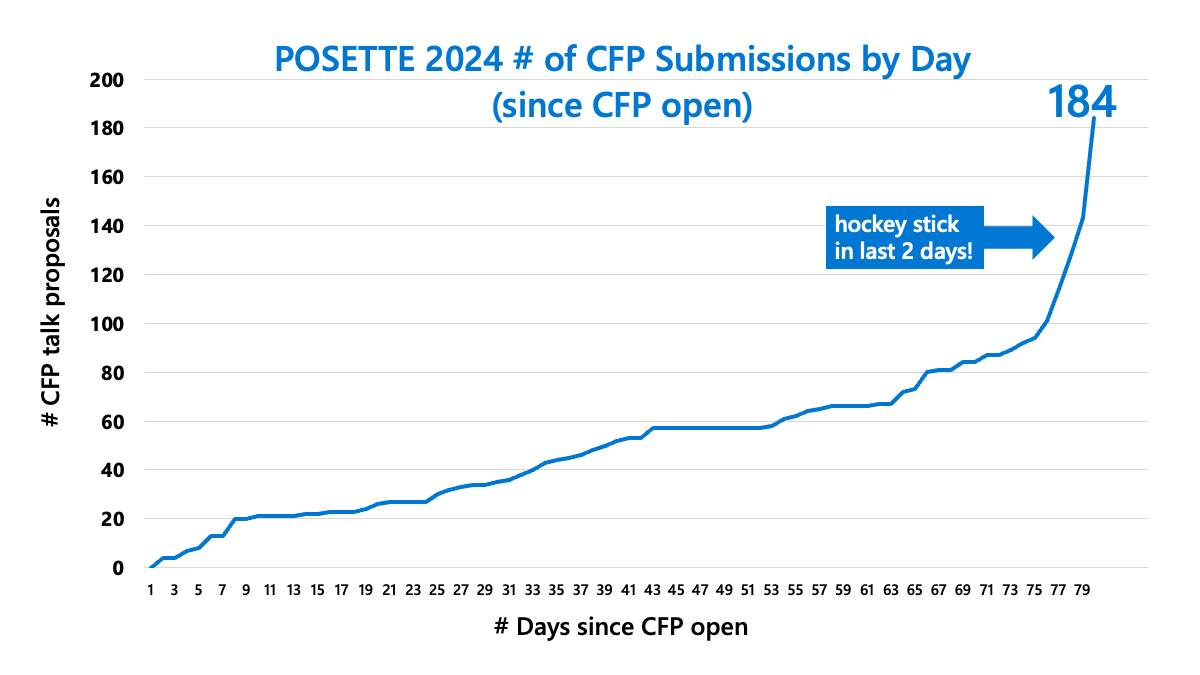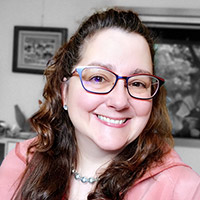Hot off the press: the schedule for POSETTE: An Event for Postgres is now available. Big welcome 🤝 to our speakers!
This post by Claire Giordano was originally published on the Microsoft Tech Community Blog.
As promised in the CFP for POSETTE: An Event for Postgres 2024, all of the talk selection decisions were emailed out on April 17th. Our talk selection work has now concluded, with the possible exception of accepting proposals from the Reserve list.
So what’s next? First I want to thank all of you Postgres people who submitted such amazing talk proposals into the CFP for POSETTE, now in its 3rd year. I was so impressed by the submissions and wish we could have accepted more of them.
And I also want to thank Alicja Kucharczyk, Daniel Gustafsson, and Melanie Plageman from POSETTE’s Talk Selection Team for contributing their time and expertise to collaborate with me to select the talks for this year’s virtual POSETTE event. It’s not easy to carefully read through and review 184 talk proposals—in just 8 days—to come up with the program for an event like #PosetteConf.
That’s right, 184 talk proposals—from 120 unique speakers. (The CFP had a maximum of 4 submissions per speaker.) With just 38 talks to accept this year, that means POSETTE 2024 has a ~20% talk acceptance rate. Bottom line, we had some difficult decisions to make.
So many great talk proposals we had to lengthen the POSETTE schedule to make space
The original POSETTE plan for 2024 was to have 4 livestreams with 9 talks each. The math looked like this:
- Each livestream would have:
- 1 invited keynote—not selected through the CFP talk selection process, but rather an invited keynote speaker
- 8 unique talks selected via the CFP process
- Hence, 36 talks total:
- 32 talks selected via the CFP process + 4 unique keynotes
However, the best laid plans of mice and men and all that, we had to throw that math out the window. There were too many good talk proposals.
Luckily the talk production team led by Teresa Giacomini was able to rejigger their recording schedules to make room for 6 more talks.
So the final POSETTE 2024 schedule will have:
- 42 talks total: 38 talks selected via the CFP process + 4 unique keynotes
And yes, we’ve already started discussions to figure out how we could support more talks in the schedule next year, for POSETTE 2025.
Here is POSETTE’s “CFP hockey stick” as evidence that many are deadline driven
Below is a chart of the CFP submissions by Day, so those of you who are deadline driven (I’m guilty as charged too) will see you’re not alone. In fact, more than 50% of the talk proposals were submitted in the last week of the CFP.
Side-note: When a talk proposal was submitted had zero bearing on the talk selection process. We didn’t start reviewing and voting until after the CFP was closed and all proposals were in the system.

Transparency into talk selection for Postgres conferences
Transparency into the process used for talk selection can be helpful for Postgres conference speakers which is why I’m writing this post. And in particular, it helps to remind yourself that many of the Postgres conference CFPs are competitive. So if your talk proposal was one of the submissions that was declined (or placed on the reserve list) for this year’s POSETTE, please remember:
- even the best speakers get rejected sometimes
- even great talk proposals get rejected sometimes
- don’t give up: please continue to submit your talk proposals—and if you want to be accepted in the future, do the work to get feedback, and make sure the submissions are on point for whatever each event is looking for
Speaking of which, there are probably some Postgres CFPs that are open right now! One big one that comes to mind is PGConf NYC 2024, happening in midtown Manhattan from Sep 30th to Oct 2nd 2024. The PGConf NYC 2024 CFP will be open until Jun 5th 2024.
About the 2-phase POSETTE talk selection process
Our talk selection team used a 2-phase process for doing talk selection.
During Phase 1
I sent the talk selection team guidance for talk selection, which was basically just a refresher about the CFP: what the goal of the event is, what types of talks and speakers we were looking for, reminders that new speakers are welcome, clarifying that it’s OK to accept a talk from a speaker who had spoken at a previous Citus Con... since after all, a good speaker is a good speaker.
We each (separately, individually) reviewed all 184 talk proposals, along with any other information and links the Speakers provided about the proposal in the Additional Notes sections and the Speaker Experience section.
We used the “Comparison evaluation method” in Sessionize to rank 3 sessions at a time. This technique is based on the Elo rating system used in the world of chess. What’s good about it is that at any given point, you’re only looking at 3 proposals. You don’t have to remember how you voted on similar talk proposals 5 hours beforehand. Rather, at any point, you’re just ranking 3 talk proposals against each other.
After completing our Comparison Evaluation, we had a rough draft Phase 1 ranking to start applying holistic considerations to.
What’s a holistic consideration?
Holistic considerations are when we look at the “whole” of the schedule, and the desire to have a balanced and diverse set of topics, teaching styles, and speakers.
For example, we knew we wanted speakers from around the globe and didn’t want to accidentally end up with speakers from just one corner of the world.
And we knew we didn’t want 50% of the talks to be about AI in Postgres. But clearly AI is a hot topic, which is why there will be a handful of super-interesting talks about the role of AI in the Postgres ecosystem.
And we knew we wanted at least a few Postgres talks that were Django-focused or Rails-focused.
We also knew there is an expectation that Postgres experts who work at Microsoft will share their expertise at this event, particularly as it relates to the Azure managed services for PostgreSQL.
However, we also wanted to make space for Postgres users and open source community members outside of Microsoft too. After all, Postgres is a global community that spans countries, companies, and timezones! The final schedule is not yet published, but I predict that over 65% (or even 70%) of the sessions will have speakers from outside of Microsoft.
During Phase 2 of POSETTE talk selection
First I needed to know how many slots we had to fill, so I reached out to the POSETTE organizing team to find out whether we could accept more than the original plan for 32 talks! So glad they said yes and we were able to accept 38 talks.
I categorized the talk proposals in a spreadsheet so we could filter and view all of the Phase 1 rankings in a few different ways, to look at the holistic considerations. Then I made a few adjustments to balance the set of accepted talks—and delivered the Talk Selection Team a proposed draft of Phase 2 rankings, with all 184 of the talk proposals in the various states of Accept / Reserve / Decline DUP1 / Decline.
Phase 2 voting involved a long ~3.5 hour meeting to decide on specific changes we each wanted to make to the final roster of accepted talks/speakers. To make a change to the Phase 2 rankings, we had to make a case for the change. As a team, we would discuss the proposed change, ask questions, advocate, and then vote. I abstained from voting during this part unless I was needed as a tie-breaker (but I did not abstain from discussion.) We did this over and over, about 12 times, until landing on the final schedule.
Thanks for all your CFP submissions!
Thank you again to everyone who submitted proposals into the CFP for POSETTE.
And big welcome to those of you whose talks are accepted to POSETTE. And to those of you whose talk proposals are on the Reserve list, we’ll reach out to you right away if a spot opens up in POSETTE for your proposal.
When will the POSETTE Schedule be announced?
As for the schedule, it gets announced on May 1st 2024. That’s when you’ll be able to see all the talks in each of the 4 livestreams for this year’s POSETTE: An Event for Postgres, happening virtually on Jun 11-13.
We hope you will be as excited about these speakers and these Postgres talks as we are.
In the meantime if you want to proactively mark your calendar for the livestreams which are most convenient for your schedule, here you go:
- Add Livestream 1 to your calendar: Tue Jun 11, 2024 | 8:00am-1:30pm PDT
(UTC-7) - Add Livestream 2 to your calendar: Wed Jun 12, 2024 | 8:00am-1:30pm CEST
(UTC+2) - Add Livestream 3 to your calendar: Wed Jun 12, 2024 | 8:00am-1:30pm PDT
(UTC-7) - Add Livestream 4 to your calendar: Thu Jun 13, 2024 | 8:00am-1:30pm CEST
(UTC+2)
You can also subscribe to POSETTE news if you want email notifications as things happen, such as when the schedule is announced or when the videos are published, or when next year’s event is announced and the CFP opens for 2025.
And of course you can always follow @PosetteConf on Threads or on X/Twitter, or on Mastodon by following @posetteconf@mastodon.social. The event hashtag is #PosetteConf.
Shout-out to transparency from other Postgres program committees
Several other PostgreSQL events this year have also shared info about their CFP submissions and talk selection processes. A few recent examples:
PGConf.dev 2024: I loved this blog post by Paul Ramsey about Building the PGConf.dev Programme about how the PGConf.dev talk selection was done, to pick 33 talks out of over 180 submissions.
pgDay Paris 2024 Program committee feedback: This PDF from the pgDay Paris 2024 program committee also sheds light into the talk selection process used to pick 12 talks out of 116 CFP submissions. A daunting task I’m sure.
PGConf.EU 2023: During the “So long and thanks for all the fish” session at the very end of PGConf.EU 2023 in Prague, Dave Page and Magnus Hagander put a slide up on the big screen that showed the number of CFP submissions by day over the course of the CFP, from CFP open to CFP close—not just for the 2023 event, but for every PGConf.EU since 20092. As you might imagine, the number of talk proposals has grown over the years commensurate with the size of PGConf.EU: The 2023 conference had over 360 submissions. With just 51 talks accepted, that's a ~14% acceptance rate for PGConf.EU 2023.
Footnotes
- Decline DUP is a state for a session proposed by a speaker who has another talk accepted already. As soon as that speaker’s talk is accepted, all the rest of their talk proposals move into the “Decline DUP” state, since we try not to accept more than 1 talk from any given speaker. ↩
- I have a photo of the PGConfEU slide about the CFP that Dave & Magnus put on screen, but don’t want to publish it without permission of the PGConf.EU team, since it’s their decision to publish it for the whole world and not just the ~500+ people who were in the room! ↩
